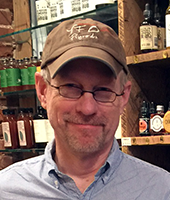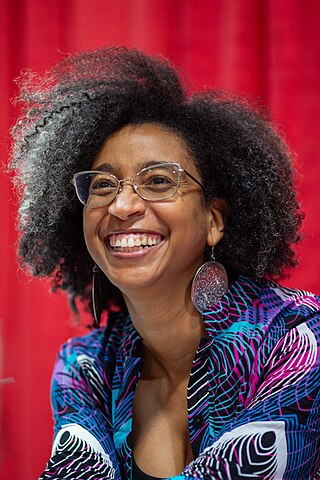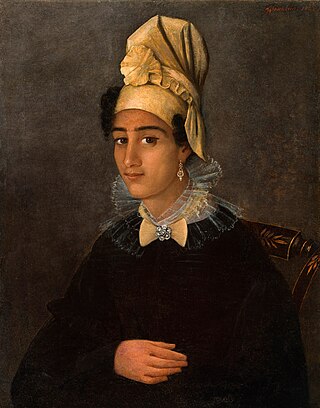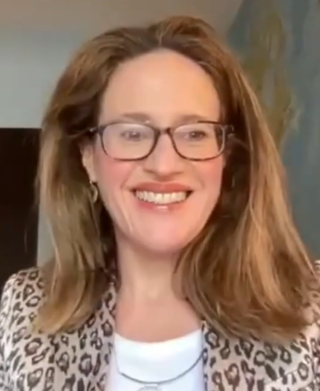Misandry is the hatred of, contempt for, or prejudice against men or boys.

The Johns Hopkins University is a private research university in Baltimore, Maryland, United States. Founded in 1876, Johns Hopkins was the first American university based on the European research institution model. The university also has graduate campuses in Italy, China, and Washington, D.C. It is considered to be the first research university in the U.S. and has been the national leader in annual research and development spending since the late 20th century.

Chimamanda Ngozi Adichie is a Nigerian writer and activist. Regarded as a central figure in postcolonial feminist literature, she is the author of the novels Purple Hibiscus (2003), Half of a Yellow Sun (2006) and Americanah (2013). Her other works include the book of essays We Should All Be Feminists (2014); Dear Ijeawele, or A Feminist Manifesto in Fifteen Suggestions (2017); a memoir, Notes on Grief (2021); and a children's book, Mama's Sleeping Scarf (2023).

Bitch was an independent, quarterly alternative magazine published in Portland, Oregon. Its tagline described it as a "feminist response to pop culture", and it was described in 2008 by Columbia Journalism Review as "a respected journal of cultural discourse". As a feminist publication, it took an intersectional approach.
Hazel Vivian Carby is Professor Emerita of African American Studies and of American Studies. She served as Charles C. and Dorathea S. Dilley Professor of African American Studies and American Studies at Yale University.

The Zanvyl Krieger School of Arts & Sciences, sometimes abbreviated KSAS, is an academic division of the Johns Hopkins University, a private research university in Baltimore, Maryland. The school is located on the university's Homewood campus. Along with the Whiting School of Engineering, it is one of the core undergraduate teaching institutions of Johns Hopkins, and offers both undergraduate and graduate programs in the humanities, natural sciences, and social sciences.

Charles Edward "Ed" Connor Jr. is an American neuroscientist who has made important contributions to the neuroscience of object synthesis in higher-level visual cortex. From 2009 he has been a Professor of Neuroscience at Johns Hopkins University. In 2007 Connor was appointed Director of the Zanvyl Krieger Mind Brain Institute at Johns Hopkins. Connor has interests in neuroaesthetics, the relation between neuroscience and beauty.
Leith Patricia Mullings was a Jamaican-born author, anthropologist and professor. She was president of the American Anthropological Association from 2011–2013, and was a Distinguished Professor of Anthropology at the Graduate Center of the City University of New York. Mullings was involved in organizing for progressive social justice, racial equality and economic justice as one of the founding members of the Black Radical Congress and in her role as President of the AAA. Under her leadership, the American Anthropological Association took up the issue of academic labor rights.
Karen Beemon is an American molecular biologist and professor of biology at Johns Hopkins University known for her research on RNA viruses and viral oncogenesis.
The Wesley Logan Prize is an annual prize given to a historian by the Association for the Study of Afro-American Life & History
Barbara Dianne Savage is an author, historian, and the Geraldine R. Segal Professor of American Social Thought and Professor of Africana Studies at the University of Pennsylvania. She teaches undergraduate and graduate and courses that focus on 20th century African American history, the history of American religious and social reform movements, the history of the relationship between media and politics and black women's political and intellectual history.

Alexis Pauline Gumbs is an American writer, independent scholar, poet, activist and educator based in Durham, North Carolina. Gumbs advocates for other POC queer women and is commonly known as a “Black Feminist love evangelist,” but she also describes herself as a "Queer Black Troublemaker." In her experimental triptych, Gumbs explores the implications of humanity’s struggle with ecological disruption and Black feminist theory and refusals.
Hanna Pickard is a Canadian philosopher who specializes in the philosophy of mind, philosophy of psychiatry, moral psychology, and medical ethics. She is a Bloomberg Distinguished Professor of Philosophy and Bioethics at Johns Hopkins University with appointments in the William H. Miller III Department of Philosophy in the Zanvyl Krieger School of Arts and Sciences and the Berman Institute of Bioethics.
Nadia Nurhussein is an American academic and author specialized in African-American literature, culture, and poetics. She is an associate professor of English and Africana studies at the Johns Hopkins Zanvyl Krieger School of Arts and Sciences.

The tignon law was a 1786 law enacted by the Spanish Governor of Louisiana Esteban Rodríguez Miró that forced black women to wear a tignon headscarf. The law was intended to halt plaçage unions and tie freed black women to those who were enslaved, but the women who followed the law have been described as turning the headdress into a "mark of distinction".
Ian B. Phillips is a British philosopher and Bloomberg Distinguished Professor of Philosophy and Psychological and Brain Sciences at the Johns Hopkins University, where he has taught since 2019. He has appointments in the William H. Miller III Department of Philosophy and the Department of Psychological and Brain Sciences in the Zanvyl Krieger School of Arts and Sciences. He is known for his works on the intersection of philosophy and brain science.

Elizabeth Hurdon was a British gynecologist and pathologist, considered the first gynecological pathologist.
Susan Cayleff is an American academic and emeritus professor at San Diego State University, having taught there from 1987 to 2020. She was one the inaugural members of the National Women's Studies Association Lesbian Caucus and served on the organization's Coordinating Council between 1977 and 1979. She founded the Women's History Seminar Series at the University of Texas Medical Branch, in Galveston, Texas; the Graduate Women's Scholars of Southern California in 1989; and was a co-founder of the SafeZones program at San Diego State University.

Sarah Marjorie Savage Pearsall is an American historian specialized in the history of North America between c. 1500 and c. 1800. She is a professor and director of undergraduate studies at the Johns Hopkins University Zanvyl Krieger School of Arts and Sciences.
Marie Baude was a Senegambian woman who was married to convicted murderer, Jean Pinet. Despite a lack of significant evidence regarding her life, Baude's narrative embodies the intricate dynamics of the transatlantic slave trade era, from her ascent as a signare, wielding influence amid the trade, to the events surrounding her husband's trial and deportation.









